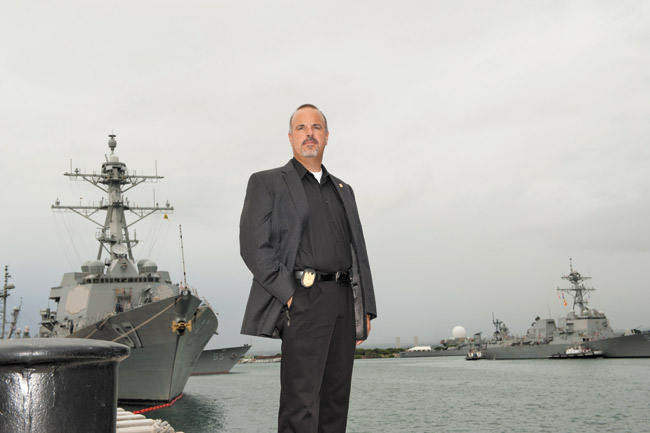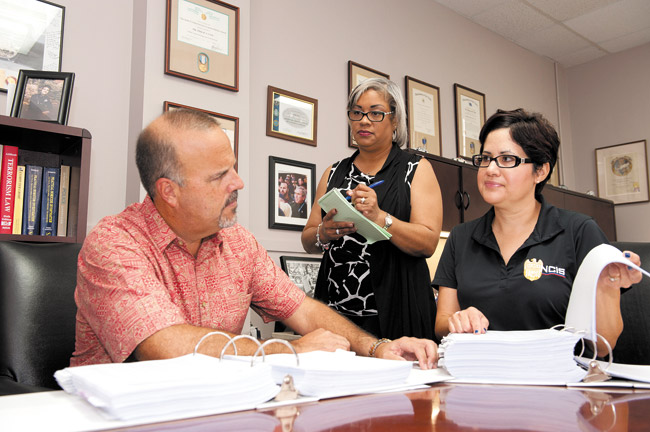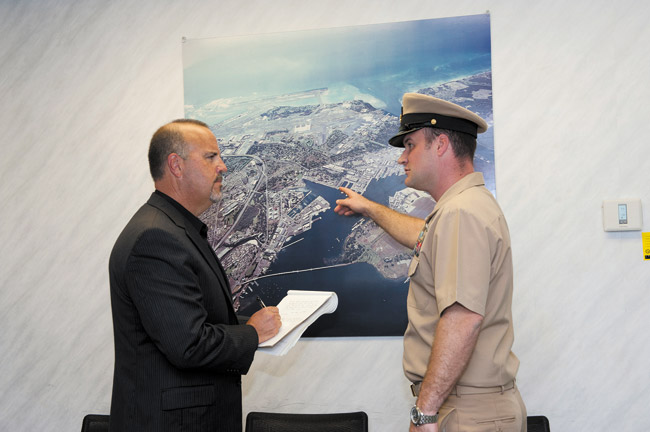NCIS: Hawaii

He seldom solves a crime in 60 minutes or less like his TV counterparts, but Tony Cox, Special Agent in Charge of Naval Criminal Investigative Service’s Hawaii Field Office, has plenty to keep him busy, from spy cases to bribery to murders. Photo by Nathalie Walker
He seldom solves a crime in 60 minutes or less like his TV counterparts, but Tony Cox, Special Agent in Charge of Naval Criminal Investigative Service’s Hawaii Field Office, has plenty to keep him busy, from spy cases to bribery to murders
In the past four years, TV’s NCIS has done the impossible: Dethroned the NFL as the most watched weekly television program in America. It would seem that unraveling the most convoluted of crimes in 60 minutes draws our attention at a higher rate than whatever magic Golden Boy Tom Brady can conjure up.
Its success has led to television offspring everywhere from Louisiana to Los Angeles, but for the real men and women of Naval Criminal Investigative Service (NCIS), the show just makes them smile.
“People are interested in us because of the shows, but it is generally hard to solve a case in an hour,” says a laughing Tony Cox, Special Agent in Charge of NCIS Hawaii Field Office.
The Hawaii region includes Pearl Harbor, of course, as well as Pacific Missile Range Facility at Barking Sands, Kaneohe Marine Corps base, Guam and Mariana Islands. Cox has 40 field agents under his command who have three basic directives: Prevent, Protect and Reduce.

Tony Cox, Special Agent in Charge, discusses a significant fraud investigation with Special Agent Jo Dempski (right) and Victoria Ferreira, program support assistant
“We aim to prevent terrorist attacks on our Navy, Marine Corps, civilian and military personnel and facilities, and that is a pretty huge mission because we are talking about more than 800,000 military members and their dependents,” explains Cox, who has been with NCIS for the past quarter century.
“On the ‘Protect’ side, we protect the Department of Navy’s most critical secrets, infrastructure and technology from foreign intelligence entities that, for nefarious reasons, are trying to get that information. Finally, to reduce crime to the best of our ability.”
Cox took over the Hawaii post in December 2013 and has been central in the investigation of Master Sgt. Nathaniel Cosby for the murder of Ivy Harris, the Navy bribery scandal involving Glenn Defense Marine Asia (GDMA) firm, and the Benjamin Bishop spying story.
But after two tours in Iraq and working drug-trafficking details in Spain for six years, his time in the Islands is a welcome respite.
“From my chair, fortunately, it is not as violent out here as it is on the Mainland, which is fine with me. I’ve seen a lot in 32 years,” says Cox, who knew he wanted to be a cop from the age of 15.

MCC John Hageman shows a map of Pearl Harbor to Cox, defining an area of suspicious activity
NATHALIE WALKER PHOTOS
“That is a fine example of us working with HPD (Honolulu Police Department). They did a lot of work, and we all bring different things to the table. We find a collaborative approach is much better,” says Cox. “Police work has to be collaborative, HPD, FBI … we each bring something to the table to hold bad people accountable for doing things to good people.”
The bribery case involving GDMA in Singapore does not have the news sizzle that a murder case tends to generate, but it may be the most insidious of the bunch. It involves a decades-long scheme of over-billing military ships for pulling into ports — with numbers climbing to more than $100 million.
Through the use of generous cash gifts, prostitutes, private parties and golf outings, it had steered business away from its competitors, but to date it has seven individuals who have pled guilty, including the owner of GDMA, Leonard Glenn Francis.
Locally, NCIS has been dealing with an espionage case right out of the television annals: 59-year-old defense contractor Benjamin Bishop leaks secrets to his 27-year-old Chinese girlfriend about war plans, nuclear weapons and missile defenses.
Bishop’s lawyers claimed it was love. NCIS called that spying and abetting the enemy. The judge agreed with NCIS and gave Bishop an 87-month sentence.
In recent years, sexual assault has become much more of a priority for NCIS and the military as a whole. It began with the Tailhook scandal in 1991, when it was alleged Navy and Marine Corps officers assaulted numerous women and men at Las Vegas Hilton. This now notorious event led NCIS to switch to a civilian director to eliminate command-influence issues, and about 97 percent of all NCIS employees are now nonmilitary personnel.
In 2013, it renewed its vision to focus on helping the victims of these crimes and not just prosecuting the perpetrators.
“Sexual assault has become a big priority in the Navy. We have implemented some policy changes that are more supportive of victims,” explains Cox. “We now have an advocate and victim legal council to make them feel more comfortable coming forward in the past few years, which is why I think we have seen a spike in the amount of reporting recently. But it has leveled off now and even seems to be coming down a little bit.”
While Cox likes the direction the Navy is heading these days, his time with NCIS rapidly is drawing to a close. This will be his last command station, and his wife has taken so much to the Islands that he believes they will be staying here upon his retirement. They have quickly fallen into the Hawaii lifestyle, enjoying all that Kailua has to offer with their only remaining child at home, Dixie the Labrador retriever.
Looking back on his choice in career, he has no regrets.
“I found it exciting because I did not want to be behind a desk all the time (even though now I am) and I liked the instant gratification: catching a bad guy at a robbery in progress and the excitement of driving the car with the siren on at 100 mph chasing bad people and doing something different every day,” says Cox.
He knew from a young age that police work was what he wanted to pursue. In high school, he served as a police cadet, riding along with officers on the job and even seeing his first dead body at age 15. He liked the thrill of the work, even though his father, who worked 30 years for NASA as a division chief in human resources, was against it.
“Dad always said that most boys want to be police officers, then they grow out of it at age 4,” says Cox with a smile, as his two siblings also are in law enforcement. His brother John is the assistant chief of police in Carrollton, Texas, and sister Andrea works with NCIS as a polygraph operator.
He began with his home-town Norfolk Police Department after graduating with a bachelor’s degree in criminal justice from Old Dominion University before joining NCIS in order to see the world. That gave him the chance to fight terrorists in Iraq, chase drug smugglers in Spain and catch spies in Hawaii.
Spending a lifetime chasing the nefarious among us would have a hardening effect on most people, but Cox hopes he just helps us all sleep a little better at night knowing men like him are on the job.
“It is hard not to become jaded because I have seen a lot of bad,” admits Cox. “Early in life I was pretty naïve, but after you have seen it for many years, you see that there is a bad element in society. But I take solace in the fact that I am trying to make our Navy and society safer.”



